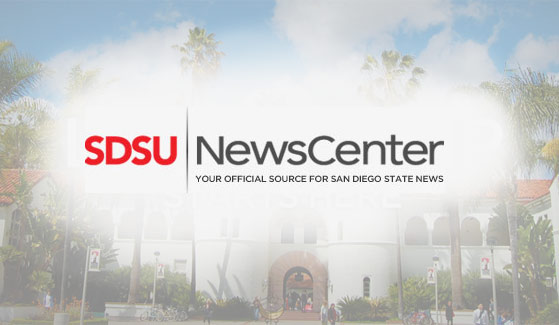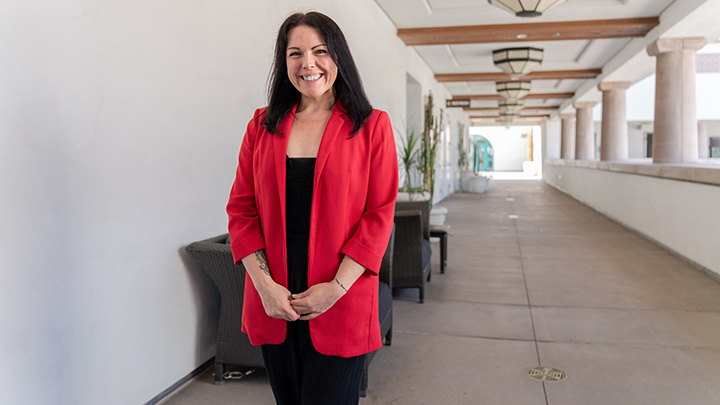Big Ideas Finalists Named
Six faculty-led research groups are recognized for advancing research projects that address major societal concerns, including homelessness, climate change, social justice and more.

Several teams of researchers have been named finalists in San Diego State University’s Big Ideas initiative, which was launched more than one year ago at the direction of SDSU President Adela de la Torre.
The finalists, announced on Tuesday, Oct. 26, will each receive dedicated university support and consultation to help secure external funding and opportunities for philanthropy as they each advance their projects.
“When we set out to identify projects, we were looking specifically for those that reflect our university’s strategic plan and the best of our research enterprise,” de la Torre said.
“Each of the finalists individually and collectively distinguish our university. They also represent the impact our researchers and scholars have within our U.S.-Mexico border region, throughout the state and around the world,” she said. “This group, leveraging our existing and developing strengths at SDSU, are some of the best minds addressing big challenges of our time.”
The finalists, whose projects are detailed on the university’s Big Ideas site, are as follows:
Addressing Homelessness is led by Mounah Abdel-Samad, an associate professor of public administration in the School of Public Affairs, and a cross-disciplinary team. The team includes SDSU faculty researchers drawn from public affairs, public health, economics, anthropology, engineering and other fields. This team brings together solutions that serve to address the underlying causes of sustained homelessness, and ways to both prevent and actively reduce it.
The AZTEC: Advancing Zero-Fossil Technologies for Engineered Carbon team, led by Marina Kalyuzhnaya, an assistant professor in the Department of Biology, will leverage expertise in renewable energy, GHG bioconversion and biomaterial engineering. The project will focus on developing renewable energies for everyday use and that help preserve the environment.
Comics and Social Justice is led by Distinguished Professor for Teaching Excellence Elizabeth Pollard in the College of Arts and Letters and librarian Pamela Jackson. This project brings together humanists, educators, librarians, scientists and artists. Together, the team will create an internationally unique comic studies collaborative. The project will bring transformational experiences to students and fans who want to explore stories of social justice through the unique medium of comics.
The CCAN: Community Climate Action Network (CCAN) is led by Rebecca Lewison, an associate professor in the Department of Biology, Distinguished Professor Emeritus of Geography Doug Stow, research ecologist Megan Jennings and Jessica Barlow, a speech language professor and director of the Phonological Typologies Laboratory. CCAN will draw on the university’s expertise in public health, sciences, arts, education and business to create actionable research and scholarship to transform community climate impact.
The Digital Platform for Lung Health team, led by Kee Moon, a mechanical engineering professor, is developing a transformative digital health platform that can monitor lung health status in real-time for large numbers of people. This project would contribute to lifelong or illness-specific health monitoring, improve tele-health and real time data to providers, and patient quality of life improvements.
Reimagining Transboundary Water is led by Natalie Mladenov, the William E. Leonhard, Jr. Chair and director of the Water Innovation and Reuse Lab, and geography professor Trent Biggs. Both will involve a team of civil, construction, and environmental engineers, geographers, economists and public health scientists in San Diego and Imperial Valley to build a transboundary community focused on solving critical water problems and impacts in the U.S.-Mexico border region.
The finalists were named following the submission of more than two dozen proposals for consideration. The Big Ideas Steering Committee reviewed all submissions, which were then shared with academic deans for additional review. The committee then advanced a list of finalists to de la Torre for final selection and approval.
“This was a highly competitive process that drew transformational ideas and projects from across our university,” said Karen May-Newman, mechanical engineering professor and chair of the Big Ideas Initiative.
“We are very proud of the finalists,” May-Newman said. “We also know that our community will soon hear of the work of teams whose projects did not make the final stage. These teams include a wide range of experts working together to tackle global challenges and effect lasting change in our communities, environment, health and other domains of life.”



